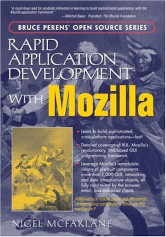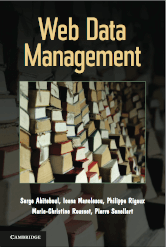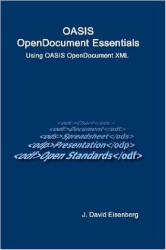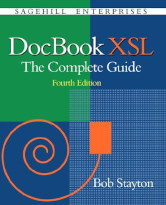Last Updated on December 25, 2024
7. Rapid Application Development with Mozilla

In Rapid Application Development with Mozilla, web, XML, and Open Standards expert Nigel McFarlane explores Mozilla’s XML User interface Language (XUL) and its library of well over 1,000 pre-built objects.
Using clear and concise instruction, McFarlane explains what companies such as AOL, IBM, Hewlett-Packard, and others already know—that Mozilla and XUL are the keys to quickly and easily creating cross-platform, web-enabled applications.
8. Web Data Management by Serge Abiteboul, et al.
 Web Data Management aims to provide a consistent material to describe the structure of information found on the Web, and to explain how this information can be efficiently represented, described and accessed.
Web Data Management aims to provide a consistent material to describe the structure of information found on the Web, and to explain how this information can be efficiently represented, described and accessed.
The primary audience are students interested in data management issues, and teachers who want to set-up a course on Web Data Modeling and large-scale data management in distributed and heterogeneous environments.
9. OASIS OpenDocument Essentials by J. David Eisenberg for O’Reilly & Associates
 OASIS Open Document Format for Office Applications is an open, XML-based file format, an open standard from the OASIS standards group. OpenDocument covers the features required by office applications: text, spreadsheets, charts, and graphical documents.
OASIS Open Document Format for Office Applications is an open, XML-based file format, an open standard from the OASIS standards group. OpenDocument covers the features required by office applications: text, spreadsheets, charts, and graphical documents.
In addition to explaining the basics of OpenDocument, this book has examples showing how to extract information from, transform, and programmatically create OpenDocument files.
This book introduces you to the XML that serves as an internal format for office applications.
10. DocBook XSL: The Complete Guide by Bob Stayton

The definitive guide to using the DocBook XSL stylesheets. It provides the missing documentation to realize the full potential of DocBook publishing.
It covers all aspects of DocBook publishing tools, including installing, using, and customizing the stylesheets and processing tools.
Pages in this article:
Page 1 – Processing XML with Java and more books
Page 2 – PHP 5 Power Programming and more books
Page 3 – Rapid Application Development with Mozilla and more books
All books in this series:
| Free Programming Books | |
|---|---|
| Ada | ALGOL-like programming language, extended from Pascal and other languages |
| Agda | Dependently typed functional language based on intuitionistic Type Theory |
| Arduino | Inexpensive, flexible, open source microcontroller platform |
| Assembly | As close to writing machine code without writing in pure hexadecimal |
| Awk | Versatile language designed for pattern scanning and processing language |
| Bash | Shell and command language; popular both as a shell and a scripting language |
| BASIC | Beginner’s All-purpose Symbolic Instruction Code |
| C | General-purpose, procedural, portable, high-level language |
| C++ | General-purpose, portable, free-form, multi-paradigm language |
| C# | Combines the power and flexibility of C++ with the simplicity of Visual Basic |
| Clojure | Dialect of the Lisp programming language |
| ClojureScript | Compiler for Clojure that targets JavaScript |
| COBOL | Common Business-Oriented Language |
| CoffeeScript | Transcompiles into JavaScript inspired by Ruby, Python and Haskell |
| Coq | Dependently typed language similar to Agda, Idris, F* and others |
| Crystal | General-purpose, concurrent, multi-paradigm, object-oriented language |
| CSS | CSS (Cascading Style Sheets) specifies a web page’s appearance |
| D | General-purpose systems programming language with a C-like syntax |
| Dart | Client-optimized language for fast apps on multiple platforms |
| Dylan | Multi-paradigm language supporting functional and object-oriented coding |
| ECMAScript | Best known as the language embedded in web browsers |
| Eiffel | Object-oriented language designed by Bertrand Meyer |
| Elixir | Relatively new functional language running on the Erlang virtual machine |
| Erlang | General-purpose, concurrent, declarative, functional language |
| F# | Uses functional, imperative, and object-oriented programming methods |
| Factor | Dynamic stack-based programming language |
| Forth | Imperative stack-based programming language |
| Fortran | The first high-level language, using the first compiler |
| Go | Compiled, statically typed programming language |
| Groovy | Powerful, optionally typed and dynamic language |
| Haskell | Standardized, general-purpose, polymorphically, statically typed language |
| HTML | HyperText Markup Language |
| Icon | Wide variety of features for processing and presenting symbolic data |
| J | Array programming language based primarily on APL |
| Java | General-purpose, concurrent, class-based, object-oriented, high-level language |
| JavaScript | Interpreted, prototype-based, scripting language |
| Julia | High-level, high-performance language for technical computing |
| Kotlin | More modern version of Java |
| LabVIEW | Designed to enable domain experts to build power systems quickly |
| LaTeX | Professional document preparation system and document markup language |
| Lisp | Unique features - excellent to study programming constructs |
| Logo | Dialect of Lisp that features interactivity, modularity, extensibility |
| Lua | Designed as an embeddable scripting language |
| Markdown | Plain text formatting syntax designed to be easy-to-read and easy-to-write |
| Objective-C | Object-oriented language that adds Smalltalk-style messaging to C |
| OCaml | The main implementation of the Caml language |
| Pascal | Imperative and procedural language designed in the late 1960s |
| Perl | High-level, general-purpose, interpreted, scripting, dynamic language |
| PHP | PHP has been at the helm of the web for many years |
| PostScript | Interpreted, stack-based and Turing complete language |
| Prolog | A general purpose, declarative, logic programming language |
| PureScript | Small strongly, statically typed language compiling to JavaScript |
| Python | General-purpose, structured, powerful language |
| QML | Hierarchical declarative language for user interface layout - JSON-like syntax |
| R | De facto standard among statisticians and data analysts |
| Racket | General-purpose, object-oriented, multi-paradigm, functional language |
| Raku | Member of the Perl family of programming languages |
| Ruby | General purpose, scripting, structured, flexible, fully object-oriented language |
| Rust | Ideal for systems, embedded, and other performance critical code |
| Scala | Modern, object-functional, multi-paradigm, Java-based language |
| Scheme | A general-purpose, functional language descended from Lisp and Algol |
| Scratch | Visual programming language designed for 8-16 year-old children |
| SQL | Access and manipulate data held in a relational database management system |
| Standard ML | General-purpose functional language characterized as "Lisp with types" |
| Swift | Powerful and intuitive general-purpose programming language |
| Tcl | Dynamic language based on concepts of Lisp, C, and Unix shells |
| TeX | Markup and programming language - create professional quality typeset text |
| TypeScript | Strict syntactical superset of JavaScript adding optional static typing |
| Vala | Object-oriented language, syntactically similar to C# |
| VHDL | Hardware description language used in electronic design automation |
| VimL | Powerful scripting language of the Vim editor |
| XML | Rules for defining semantic tags describing structure ad meaning |
